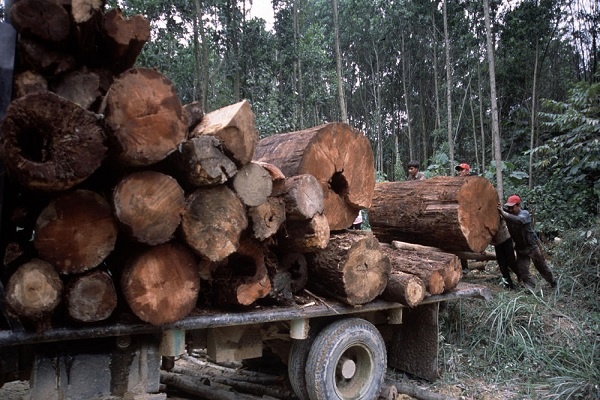
The European Union (EU) and FAO have agreed to step up joint efforts to support tropical timber producing countries in curbing illegal logging, improving forest governance and promoting the trade of legally sourced timber. Doing so is expected to not only reduce the environmental impacts of illegal logging and mitigate climate change but will also boost the incomes and food security of forest communities by improving access to domestic and international wood markets.
A $30 million funding agreement was formalized here today by Veronique Lorenzo of the European Commission Directorate-General for International Cooperation and Development, and René Castro Salazar, FAO Assistant Director-General for Forestry, to support the next phase of FAO’s Forest Law Enforcement, Governance and Trade (FLEGT) Programme, set to run through 2020.
That sum includes approximately $18 million from the EU, $7.25 million from the United Kingdom and $5.3 million from the Government of Sweden.
Illegal logging and associated trade costs governments an estimated $10-15 billion per year in lost tax revenues. It also undermines people’s livelihoods and robs them of income and food. And it is responsible for the degradation of large swathes of carbon-rich forests and vital wildlife habitats, contributing to climate change and biodiversity loss.
Focus on empowering smallholders
A key part of the new phase involves greater collaboration with private sector entities, big and small, in both producer and consumer countries, to address some of the bottlenecks to producing legal timber.
This will involve looking specifically at empowering small- and medium forest enterprises in Africa, Latin America, the Caribbean and Asia, which employ some 140 million people worldwide. The idea is to help them to “go legal”, gain access to green markets and become active participants in the sustainable management of forest resources.
“Thanks to global initiatives like FLEGT, illegal timber production has declined by an estimated 22 percent since 2002,” said Castro. “The new FLEGT phase offers an important opportunity for lesson sharing across sectors, as it has become increasingly clear that broad partnerships are and will be needed to achieve the global impact that is necessary to reduce forest loss, food vulnerability and mitigate climate change.”
Lorenzo said: “New evidence confirms that FLEGT has led to improved forest governance in all targeted countries. FAO continues to make a significant contribution by providing technical assistance and resources to stakeholders. This new phase is expected to scale up this work in strategic countries, in particular by engaging the private sector.”
“We’ve achieved a lot, but there is more work to be done. Building on the success of previous phases, FAO will help smallholder wood producers, who often have difficulties verifying compliance with legality standards, gain access to green markets and improve their livelihoods,” said Julia Falconer, Senior Forestry Advisor at the Department for International Development of the United Kingdom (DFID).
Piloting new technologies to track timber
To date, the FAO FLEGT Programme has supported over 200 projects in some 40 tropical timber producing countries throughout Africa, Latin America, the Caribbean and Asia. Some of the most promising initiatives being piloted involve using new technologies to efficiently track the origin of wood.
In Colombia, for example, the programme is supporting the use of digital android applications to strengthen tracking and control mechanisms by environmental authorities and guide consumers in purchasing legal and sustainable timber.
Similarly, a logging vehicle tracking system is being piloted by a partner NGO in the Congo Basin countries — including Cameroon, Côte d’Ivoire, the Democratic Republic of the Congo and the Republic of the Congo — to intercept illegal timber at different stages in the forest supply chain, facilitating monitoring efforts by forestry authorities and improving accountability and traceability.
Technology is just one part of the solution. In Myanmar, for example the programme is supporting efforts towards legal community- and smallholder-timber production to boost smallholder timber revenues. In Honduras, resolving land ownership disputes is becoming a key thread of Programme support. In the Republic of the Congo, resources are being channeled to state and non-state actors to help forest enterprises communicate their legal credentials to the public.
Owing to the multiple contributions of forests to provide jobs and income, food and medicine, and critical environmental services, the world’s new international development agenda includes their sustainable management as one of the 2030 Sustainable Development Goals.











